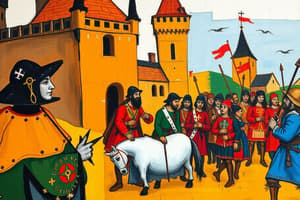Podcast
Questions and Answers
What was a significant outcome of the First Hundred Years' War?
What was a significant outcome of the First Hundred Years' War?
- England gained more territories in France
- The Treaty of Paris ended the war and reduced English lands in France (correct)
- The Magna Carta was signed during this period
- Philip Augustus successfully unified all of France
Who was persuaded by Philip Augustus to rebel against Richard the Lionheart?
Who was persuaded by Philip Augustus to rebel against Richard the Lionheart?
- Henry III
- Louis VII
- King John (correct)
- Philip II
What prompted the landowners to rebel against King John?
What prompted the landowners to rebel against King John?
- Richard's return from battle
- John's refusal to adhere to the Magna Carta (correct)
- The signing of the Treaty of Paris
- A series of successful battles against France
Which king became known as Richard the Lionheart?
Which king became known as Richard the Lionheart?
What years did the First Hundred Years' War span?
What years did the First Hundred Years' War span?
Who signed the Magna Carta in 1215?
Who signed the Magna Carta in 1215?
Which king succeeded Henry II as King of England?
Which king succeeded Henry II as King of England?
What did Philip Augustus achieve during his reign?
What did Philip Augustus achieve during his reign?
Flashcards
First Hundred Years' War
First Hundred Years' War
A period of conflict between England and France lasting from 1159 to 1259.
Royal Families of England and France
Royal Families of England and France
The Plantagenet and Capet families were the ruling houses of England and France respectively.
Henry II
Henry II
King of England from 1154 to 1189, known for expanding English territory in France.
Philip Augustus
Philip Augustus
Signup and view all the flashcards
Richard the Lionheart
Richard the Lionheart
Signup and view all the flashcards
John
John
Signup and view all the flashcards
Magna Carta
Magna Carta
Signup and view all the flashcards
Treaty of Paris
Treaty of Paris
Signup and view all the flashcards
Magna Carta
Magna Carta
Signup and view all the flashcards
Henry III
Henry III
Signup and view all the flashcards
Treaty of Paris
Treaty of Paris
Signup and view all the flashcards
Study Notes
The First Hundred Years' War
- The 12th century saw conflict between England and France, lasting from 1159 to 1259 CE.
- England, ruled by the Plantagenets, held significant French lands.
- French kings, particularly the Capets, sought to reclaim their lost territories.
- Henry II (England) expanded English territory in France, leading to major battles.
- Philip Augustus (France) challenged Henry II and later his son, Richard I.
- Richard I, known as Richard the Lionheart due to his reputation as a warrior, became King of England.
- Richard's brother, John, became king after Richard's death.
Conflict and the Magna Carta
- King John faced conflict with France, losing territories.
- In 1215, King John signed the Magna Carta, aiming to protect the rights of wealthy landowners.
- King John's failure to uphold the Magna Carta caused discontent and internal conflict.
- England was weakened by internal conflicts that coincided with wars with other countries.
End of the War
- The First Hundred Years' War lasted for 100 years (1159-1259)
- Ended with the Treaty of Paris.
- Henry III (England) agreed to relinquish substantial French land holdings.
Studying That Suits You
Use AI to generate personalized quizzes and flashcards to suit your learning preferences.





